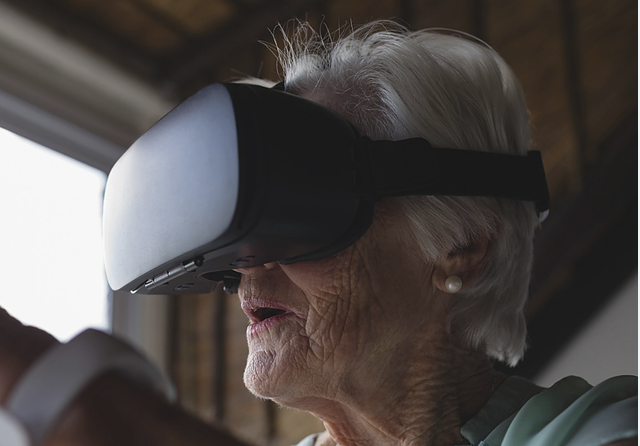
Carleigh Berryman, founder of Viva Vita, fits seniors with VR headsets in an assisted living community. (Credit: freethink.com video)
Traveling the World Via Headsets Helps Alleviate Depression Symptoms
A story on freethink.com describes the life-changing effects of using virtual reality programs for seniors who have reported being lonely, depressed and suffering related physical ailments.
As aging Baby Boomers face futures without partners, less mobility and reduced social interaction, VR could be a solution to lift them out of their misery, according to Viva Vita, an organization that seeks to improve mental health and quality of life for seniors in assisted living communities or who are homebound.
“Once we put on the headset, you can tell that they’ve never seen anything like it before,” Carleigh Berryman, founder of Viva Vita, told freethink.com. “Their mind is completely blown.”

Image of senior using VR from Via Vita.
More than 6 million people experience late-life depression due to the impact of aging both on the mental or physical abilities of seniors, according to the Centers for Disease Control and Prevention (CDC).
Depression affects about 1%-5% of the general elderly population, 13.5% in elderly who require home healthcare, and 11.5% in older hospital patients. It’s not a normal part of growing older, according to the CDC, but it’s often misdiagnosed or mistreated.
“We’ve been to Paris. We took a tour of London. We went to my hometown in Guyana. I swam with the fish, flew with the birds, and entered paintings,” said one resident of an assisted living community, which Viva Vita visits regularly. “It’s a great experience for people who are trapped in their bodies,” said another.
Viva Vita has worked with more than 300 seniors so far in Virginia, Washington D.C. and Maryland areas. Their goal is to collect data with systems for measuring, recording, and tracking the impact, to promote its use. Berryman wants participants to track and monitor their progress on mood, energy levels, and feelings of positivity during repeat sessions.
“As virtual reality technology improves, it will bolster our ability to treat loneliness and depression in seniors, improving their quality of life in the golden years,” Berryman said.







Leave A Comment